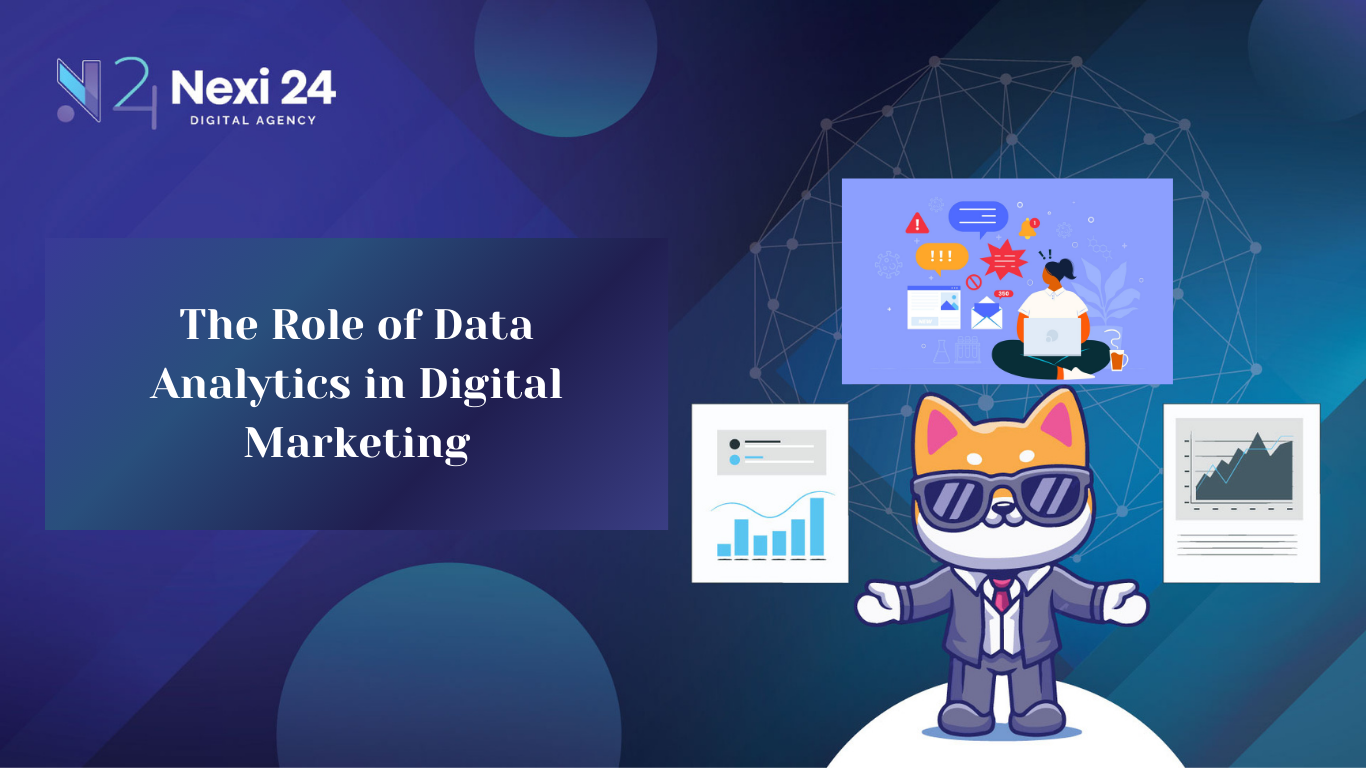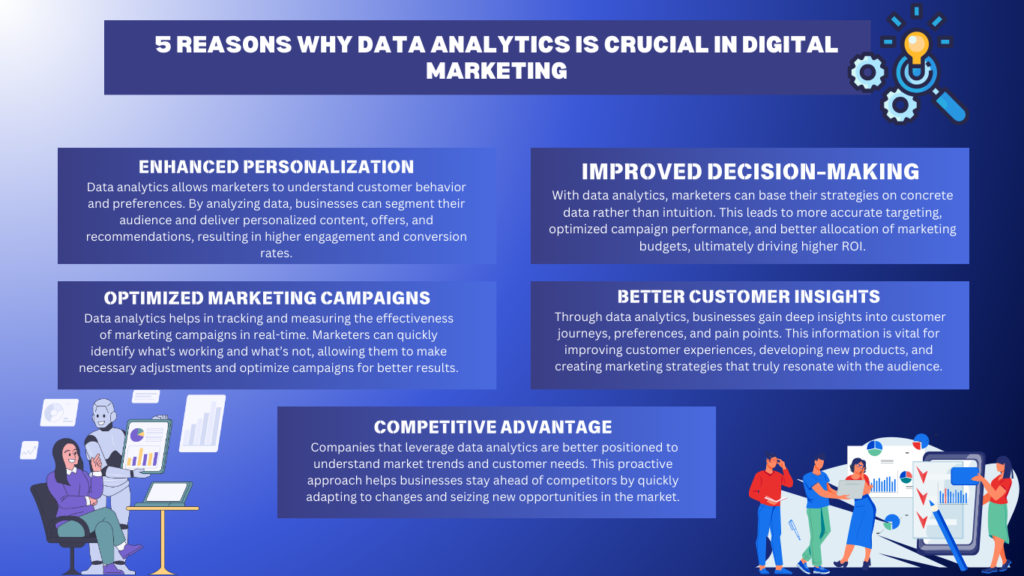The Role of Data Analytics in Digital Marketing

Introduction
In today’s fast-paced digital world, data analytics has become the backbone of effective digital marketing strategies. By leveraging data, businesses can make informed decisions that drive growth and improve customer experiences. But what exactly is data analytics, and how does it fit into the realm of digital marketing? Let’s dive in and explore the crucial role of data analytics in digital marketing.
What is Data Analytics?
Data analytics refers to the process of examining raw data to uncover patterns, trends, and insights. It involves using statistical tools and techniques to analyze data and transform it into useful information. There are several types of data analytics:
- Descriptive Analytics: This type focuses on summarizing past data to understand what has happened.
- Diagnostic Analytics: It delves deeper to understand why something happened.
- Predictive Analytics: This type uses historical data to forecast future outcomes.
- Prescriptive Analytics: It provides recommendations for actions based on the data analysis.
The Evolution of Digital Marketing
Digital marketing has come a long way from its early days. Initially, it was all about email campaigns and banner ads. However, with the advent of social media, search engines, and mobile technology, digital marketing has evolved significantly. Today, it’s about creating personalized experiences and engaging with customers on a deeper level. The shift towards data-driven strategies has been a game-changer, enabling marketers to target their audiences more effectively and measure the success of their campaigns with precision.
How Data Analytics Enhances Digital Marketing
- Personalization and Customer Segmentation
Data analytics allows marketers to segment their audience based on various factors such as demographics, behavior, and preferences. This segmentation enables the creation of highly personalized marketing campaigns that resonate with specific audience segments. Personalization not only improves customer engagement but also increases conversion rates.
- Improving Customer Engagement
By analyzing data from various sources, marketers can gain insights into customer behavior and preferences. This information helps in creating content and offers that are relevant to the audience, thereby improving customer engagement. For instance, analyzing social media interactions can provide valuable insights into what type of content resonates with the audience.
- Enhancing Customer Experience
Data analytics plays a crucial role in enhancing the customer experience. By understanding customer journeys and pain points, businesses can make data-driven decisions to improve their products and services. This leads to higher customer satisfaction and loyalty.
Data Collection Methods in Digital Marketing
- Website Analytics
Website analytics tools like Google Analytics provide detailed insights into how visitors interact with a website. Marketers can track metrics such as page views, bounce rates, and conversion rates to understand website performance and optimize user experience.
- Social Media Analytics
Social media platforms offer built-in analytics tools that help marketers track engagement metrics such as likes, shares, comments, and follower growth. These insights are crucial for understanding the effectiveness of social media campaigns and making data-driven decisions.
- Email Marketing Analytics
Email marketing platforms provide analytics on open rates, click-through rates, and conversion rates. These metrics help marketers understand the performance of their email campaigns and make necessary adjustments to improve results.
Key Metrics in Digital Marketing Analytics
- Traffic Metrics
Traffic metrics such as page views, unique visitors, and session duration help marketers understand the volume and quality of website traffic. These metrics are essential for assessing the effectiveness of marketing campaigns in driving traffic to the website.
- Conversion Metrics
Conversion metrics like conversion rate, cost per conversion, and return on ad spend (ROAS) are critical for measuring the success of marketing campaigns. These metrics provide insights into how well the campaigns are driving desired actions, such as purchases or sign-ups.
- Engagement Metrics
Engagement metrics, including likes, shares, comments, and click-through rates, help marketers understand how well their content is resonating with the audience. High engagement rates indicate that the content is relevant and engaging for the audience.

Tools for Data Analytics in Digital Marketing
- Google Analytics
Google Analytics is a powerful tool that provides detailed insights into website performance. It helps marketers track key metrics such as traffic, conversions, and user behavior, enabling data-driven decision-making.
- Social Media Analytics Tools
Social media platforms like Facebook, Twitter, and Instagram offer built-in analytics tools that provide insights into engagement metrics. Additionally, third-party tools like Hootsuite and Sprout Social offer more advanced analytics and reporting features.
- Customer Relationship Management (CRM) Systems
CRM systems like Salesforce and HubSpot help businesses manage customer interactions and track customer data. These systems provide valuable insights into customer behavior and preferences, enabling personalized marketing campaigns.
The Role of Big Data in Digital Marketing
Big data refers to the large volumes of data generated by digital interactions. It includes data from various sources such as social media, websites, and mobile apps. Big data analytics involves analyzing this data to uncover patterns and insights that can drive marketing strategies.
Applications of Big Data in Marketing
- Customer Insights
Big data analytics provides deep insights into customer behavior, preferences, and trends. This information helps marketers create targeted campaigns that resonate with the audience.
- Predictive Modeling
Predictive modeling uses big data to forecast future outcomes. In digital marketing, predictive models can be used to anticipate customer behavior, optimize marketing campaigns, and improve ROI.
Predictive Analytics in Digital Marketing
Predictive analytics involves using historical data to make predictions about future outcomes. In digital marketing, predictive analytics can be used to forecast customer behavior, optimize marketing strategies, and improve campaign performance.
Benefits of Predictive Analytics
- Improved Targeting
Predictive analytics helps marketers identify high-value prospects and target them with personalized campaigns. This improves the efficiency and effectiveness of marketing efforts.
- Optimized Marketing Spend
By predicting which marketing strategies will be most effective, businesses can optimize their marketing spend and allocate resources more efficiently.
Challenges in Implementing Data Analytics
- Data Privacy Concerns
With the increasing amount of data being collected, data privacy has become a major concern. Marketers must ensure that they are complying with data privacy regulations and protecting customer data.
- Integrating Data from Different Sources
Integrating data from various sources can be challenging. Marketers need to ensure that the data is accurate and consistent across all platforms to make informed decisions.
Case Studies of Successful Data-Driven Marketing Campaigns
- Personalized Email Marketing
A leading e-commerce company used data analytics to segment its audience and send personalized email campaigns. The result was a significant increase in open rates, click-through rates, and conversions.
- Social Media Targeting
A global brand used social media analytics to understand its audience better and create targeted ad campaigns. The campaign saw a substantial increase in engagement and conversions.
Future Trends in Data Analytics and Digital Marketing
- AI and Machine Learning
Artificial intelligence and machine learning are transforming data analytics. These technologies enable marketers to analyze large volumes of data quickly and uncover insights that were previously impossible to find.
- Real-Time Data Analytics
Real-time data analytics allows marketers to make instant decisions based on current data. This is particularly useful for optimizing campaigns and responding to market changes quickly.
The Impact of Data Analytics on ROI
Data analytics plays a crucial role in measuring and improving ROI. By analyzing key metrics, businesses can understand the effectiveness of their marketing campaigns and make data-driven decisions to optimize their strategies.
Measuring ROI with Data Analytics
- Conversion Tracking
Tracking conversions is essential for measuring ROI. Data analytics tools help marketers track conversions and understand the factors that contribute to success.
- Attribution Modeling
Attribution modeling helps businesses understand which marketing channels are driving the most value. This enables them to allocate their marketing budget more effectively and improve ROI.
Best Practices for Using Data Analytics in Digital Marketing
- Setting Clear Goals
Setting clear, measurable goals is essential for successful data analytics. Marketers need to define what they want to achieve and track the relevant metrics to measure success.
- Continuous Monitoring and Optimization
Data analytics is an ongoing process. Marketers need to continuously monitor their campaigns, analyze the data, and make necessary adjustments to optimize performance.
Conclusion
In conclusion, data analytics is a powerful tool that enhances digital marketing strategies. By leveraging data, businesses can create personalized experiences, improve customer engagement, and optimize their marketing efforts. As technology continues to evolve, the role of data analytics in digital marketing will only become more significant. Embracing data-driven strategies is essential for businesses looking to stay ahead in the competitive digital landscape.
FAQs
- What is the role of data analytics in digital marketing?
Data analytics helps businesses make informed decisions, personalize marketing campaigns, improve customer engagement, and measure the success of their efforts. - How can small businesses benefit from data analytics in their marketing efforts?
Small businesses can use data analytics to understand their audience, optimize their marketing spend, and create targeted campaigns that drive growth. - What are the most important metrics to track in digital marketing?
Key metrics include traffic metrics (page views, unique visitors), conversion metrics (conversion rate, cost per conversion), and engagement metrics (likes, shares, comments). - How does predictive analytics improve digital marketing strategies?
Predictive analytics uses historical data to forecast future outcomes, helping marketers optimize their strategies, target high-value prospects, and improve ROI. - What tools are essential for data analytics in digital marketing?
Essential tools include Google Analytics, social media analytics tools, and customer relationship management (CRM) systems.

